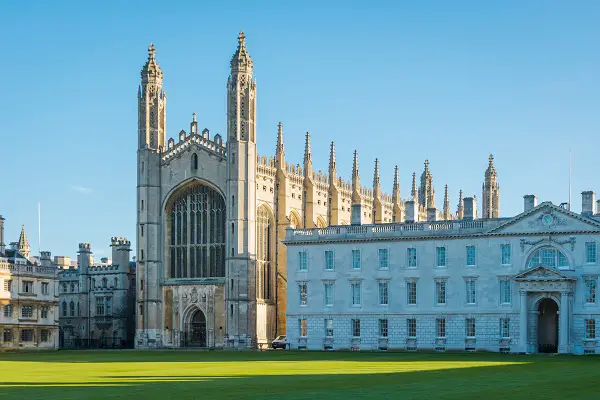Scholarship details
The Malati Kanbur fund will provide a complete scholarship to cover tuition and living expenses for one domestic or international student.
The winning student will be supervised by Professor Jonathan Mant, Head of Primary Care Unit, and will write their dissertation on stroke and aging research. Lucy Cavendish must be the applicant’s first choice of college.
About the Scholarship:
The University of Cambridge, founded in 1209, is a public research university in Cambridge, United Kingdom. It is the world’s fourth-oldest university and the second-oldest in the English-speaking world. It is a self-governed community of students as well as one of the world’s oldest universities and renowned educational institutions. This university is made up of 31 constituent colleges and over 100 academic departments that are grouped into six schools: Arts and Humanities, Biological Sciences, Clinical Medicine, Humanities and Social Sciences, Physical Sciences, and Technology. Each School has a Council, which includes representatives from its Faculties and Departments. On the General Board, the Schools are represented. Cambridge is steeped in history, and its world-famous colleges and university structures draw tourists from all over the globe. However, the University’s museums and collections contain many gems that provide an interesting glimpse into some of the University’s professors and students’ scholarly endeavors, both past and present. The university’s Cambridge University Press is the world’s oldest publishing house and the world’s second-largest university press. It employs about 11,000 people and operates 31 colleges, as well as 150 departments, faculties, schools, and other organizations. The University has an international community that invites brilliant students from all around the world. The university currently has over 20,000 undergraduate and postgraduate students, including about 9,000 international students from more than 140 countries. Around 25% of undergraduates and 50% of graduate students are from outside the United Kingdom. Cambridge currently has a population of 23,380 students from all walks of life, 10,910 of whom are graduates and 12,480 of whom are undergraduates; among the graduate students, 50 percent come from outside the UK, and around 40% are women; over 11,000 staff, 31 Colleges, and 150 Departments, Faculties, Schools, and other institutions; and over 11,000 staff, 31 Colleges, and 150 Departments, Faculties, Schools, and other institutions. The University has an international community that invites brilliant students from all around the world. Over 120,000 Cambridge alumni live in over 200 countries.
The University of Cambridge has a long and illustrious history, and visitors from all over the world flock to see its famed Colleges and University buildings. However, the University’s museums and collections contain many gems that provide an interesting glimpse into some of the University’s professors and students’ scholarly endeavors, both past and present. All students, as well as many professors, are affiliated with colleges, which are where they live, eat, and socialize. It is also where students undergo supervisions, which are small group teaching sessions. Each college appoints its own teaching staff and fellows in each subject; determines which students to admit in accordance with University regulations; provides small group teaching sessions for undergraduates (though lectures are arranged and degrees are awarded by the university); and is responsible for the domestic arrangements and welfare of its own undergraduates, graduates, post-doctoral researchers, and general staff. A graduate is a lifelong member of his or her college.
The University of Cambridge is a self-governing community of scholars and one of the world’s oldest universities and prominent academic centers. Its international reputation for great academic accomplishment is based on the intellectual achievements of its students as well as world-class original research conducted by the University and Colleges’ faculty. At first, the University of Cambridge only accepted male students. Emily Davies created Girton College in 1869, which was the first college to admit women. In 1872, Newnham College was founded. Women were allowed to study courses, take exams, and have their findings recorded during the late nineteenth century, but they were denied full university membership. Women might receive a partial degree, known as a titular degree, in the twentieth century, but they were barred from university governance. Women were not admitted as full members of the university until 1947. Cambridge University is made up of several institutions, with the university’s primary functions distributed between the university’s central departments and university colleges. Each department is in charge of doing research and delivering centralized lectures to Cambridge students in general. The general welfare and domestic management of all students and some university workers are the responsibility of university colleges. The majority of small group teaching for undergraduates, known as tutorial supervisions, is also provided by colleges. The university’s thirty-one colleges are largely self-contained and have substantial autonomy. Colleges have the authority to choose which students to accept and to appoint their own “senior members,” or professors. The University of Cambridge is often regarded as one of the UK’s most academically selective universities. Cambridge consistently ranks first in the League Tables of British Universities, a system that rates the best universities in the United Kingdom. Cambridge was awarded the best institution in the United Kingdom in 2001 by England’s Research Assessment Exercise. According to a British research published in 2005, Cambridge graduates significantly more Ph.D. recipients each year than any other British university. According to a Thomson Scientific report from 2006, Cambridge produces the most research papers of any British university. Cambridge was also ranked the top research generator in 10 of the 21 key British research categories.
The Coimbra Group, the League of European Research Universities, the International Alliance of Research Universities, and the Russell Group, a network of big, research-oriented British universities, all recognize Cambridge as a premier European university. The development of high-tech business clusters in and around Cambridge is very intimately related to Cambridge University. The “Silicon Fen” is a nickname for this area. After Silicon Valley in the United States, Silicon Fen was estimated to be the world’s second largest venture capital market in 2004. According to 2006 estimates, Silicon Fen hosted over 250 active startup companies that were directly tied to the University and were valued a total of $6 billion in US dollars.
Scholarship Sponsor(s): University of Cambridge
Scholarship Country: United Kingdom
Scholarship Worth: £50,000
Study Level: Masters
Nationality: International Students
Scholarship Offer:
Scholarships worth £50,000 are available (annual)
Eligibility for Scholarship
- Primary Care Research must be the specialization theme for the MPhil in Population Health Science.
- The focus of the dissertation should be on stroke and elderly research.
Nationality
The University of Cambridge 2022 Malati Kanbur Fund is open to all international students
Application Procedure
Visit the University of Cambridge website for additional information.
Application Deadline
The application deadline for University of Cambridge 2022 Malati Kanbur Fund is March 31, 2022





















